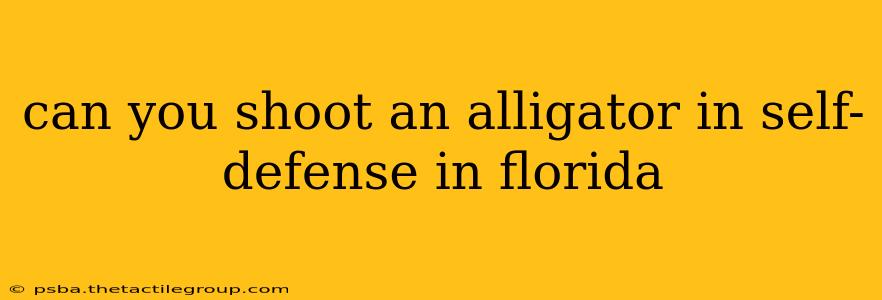Can You Shoot an Alligator in Self-Defense in Florida? Navigating the Complexities of Florida's Alligator Laws
Florida is renowned for its abundant wildlife, and among its iconic inhabitants is the American alligator. While these magnificent creatures are generally shy and avoid human contact, encounters can occur, raising the crucial question: Can you shoot an alligator in self-defense in Florida? The answer, unfortunately, isn't a simple yes or no. It's a complex legal landscape requiring careful consideration.
Understanding Florida's Alligator Laws
Florida's Fish and Wildlife Conservation Commission (FWC) strictly regulates alligator interactions. While it's illegal to hunt or kill alligators without a permit, self-defense is a critical exception. However, the circumstances surrounding the use of lethal force must meet specific legal criteria. Simply feeling threatened isn't sufficient justification.
When Lethal Force May Be Justified
The use of lethal force against an alligator in Florida is permissible only when facing an imminent threat of death or serious bodily injury. This means the alligator's actions must demonstrate an immediate, unavoidable danger to your life or well-being. Key factors considered include:
- Imminent Threat: The alligator must be actively attacking or posing an immediate, credible risk of attack. A distant sighting or even a threatening posture is not enough.
- Proportionality of Force: Shooting an alligator is a drastic measure. All other reasonable options to deter the alligator must be exhausted before resorting to lethal force. This might include retreating to safety, making loud noises, or using non-lethal deterrents.
- Reasonable Belief: The individual using lethal force must have a reasonable belief that they are in imminent danger and that using deadly force is the only way to prevent death or serious injury. This requires a judgment call based on the immediate circumstances.
After the Incident: Crucial Steps to Take
If you are forced to shoot an alligator in self-defense, you must immediately:
- Ensure Your Safety: Prioritize your safety and seek medical attention if necessary.
- Report the Incident: Contact the FWC's nuisance alligator hotline immediately. Providing accurate and detailed information about the event is crucial for the investigation.
- Cooperate with Authorities: Fully cooperate with law enforcement and FWC investigators during their investigation. Providing false information can lead to severe legal consequences.
- Retain Legal Counsel: It's strongly recommended to consult with an attorney specializing in wildlife law. They can advise you on your rights and responsibilities and guide you through the legal process.
Prevention is Key: Minimizing Alligator Encounters
The best approach to avoid dangerous alligator encounters is proactive prevention:
- Avoid Feeding Alligators: Feeding alligators habituates them to human presence and increases the risk of dangerous interactions. Never feed or attempt to interact with alligators.
- Keep a Safe Distance: Maintain a safe distance from alligators, especially in known alligator habitats. Never approach or swim near alligators.
- Supervise Children: Children should always be closely supervised near water bodies where alligators might be present.
- Be Aware of Surroundings: Pay attention to your surroundings and be vigilant for signs of alligators, such as tracks, nests, or basking alligators.
Conclusion: A Grave Decision with Serious Legal Ramifications
Shooting an alligator in self-defense is an extremely serious decision with far-reaching legal implications. While Florida law acknowledges the necessity of self-preservation, it strictly regulates the use of lethal force against alligators. Understanding the law, exhausting all non-lethal options, and immediately reporting the incident are paramount. If you ever find yourself in such a situation, prioritize your safety, contact authorities, and seek legal counsel. Remember, prevention remains the most effective tool in mitigating the risk of dangerous alligator encounters.

